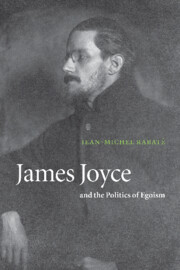Book contents
- Frontmatter
- Contents
- Preface
- List of abbreviations
- 1 Après mot, le déluge: the ego as symptom
- 2 The ego, the nation, and degeneration
- 3 Joyce the egoist
- 4 The esthetic paradoxes of egoism: from negoism to the theoretic
- 5 Theory's slice of life
- 6 The egoist vs. the king
- 7 The conquest of Paris
- 8 Joyce's transitional revolution
- 9 Hospitality and sodomy
- 10 Hospitality in the capital city
- 11 Joyce's late Modernism and the birth of the genetic reader
- 12 Stewardship, Parnellism, and egotism
- Notes
- Bibliography
- Index
8 - Joyce's transitional revolution
Published online by Cambridge University Press: 22 September 2009
- Frontmatter
- Contents
- Preface
- List of abbreviations
- 1 Après mot, le déluge: the ego as symptom
- 2 The ego, the nation, and degeneration
- 3 Joyce the egoist
- 4 The esthetic paradoxes of egoism: from negoism to the theoretic
- 5 Theory's slice of life
- 6 The egoist vs. the king
- 7 The conquest of Paris
- 8 Joyce's transitional revolution
- 9 Hospitality and sodomy
- 10 Hospitality in the capital city
- 11 Joyce's late Modernism and the birth of the genetic reader
- 12 Stewardship, Parnellism, and egotism
- Notes
- Bibliography
- Index
Summary
Joyce's decision to stay in Paris was no doubt connected with the impression derived after a few years of having found there not only a safe haven but also a place where “les jeunes” would listen to him respectfully, look to him as a pioneer, and accept to “book their berths” with him. This can be attributed in great part to the positive influence of Eugène Jolas. Joyce's relation to Eugène Jolas can be understood as much in terms of overlapping egos as determined by their parallel trajectories in philosophy, politics, and esthetics. The movement that led to their collaboration needs to be precisely historicized, as the waning of a certain type of “happy avant-garde” with the turn from the twenties to the thirties. It could also be recontextualized from the vantage point of the present, now that the last century's main literary achievement has been identified as Uysses. However, let us not be swayed too quickly by the Modern Library's vote, since we cannot ignore that Jolas and his associates had long ago announced the death of the novel: “The Novel is dead / Long live the novel” – a proclamation to be found at the end of transition no. 18 (November 1929, no p.). The manifesto-like tract vigorously asserted “The novel of the future will take no cognizance of the laws imposed by professors of literature and critics.”
- Type
- Chapter
- Information
- James Joyce and the Politics of Egoism , pp. 141 - 152Publisher: Cambridge University PressPrint publication year: 2001



